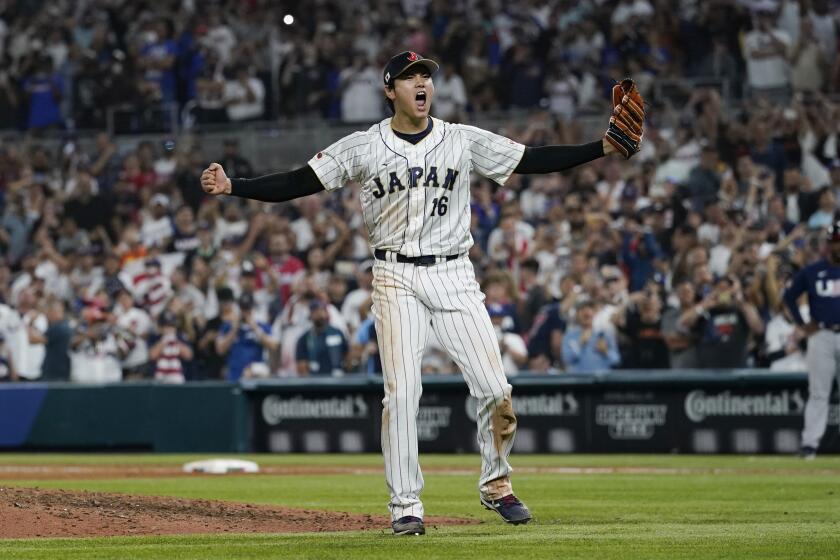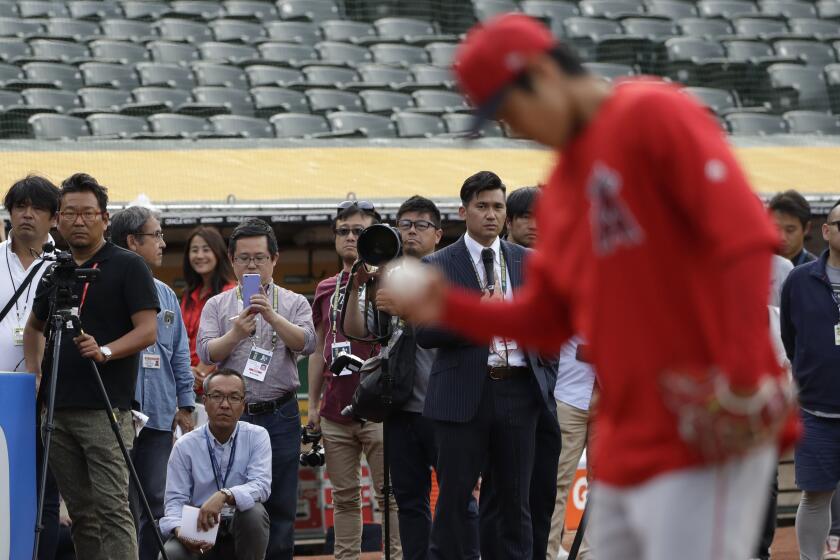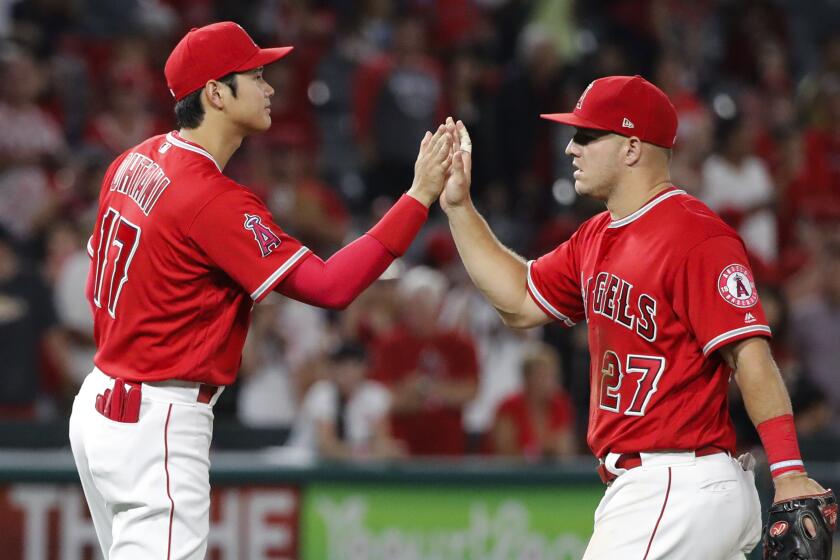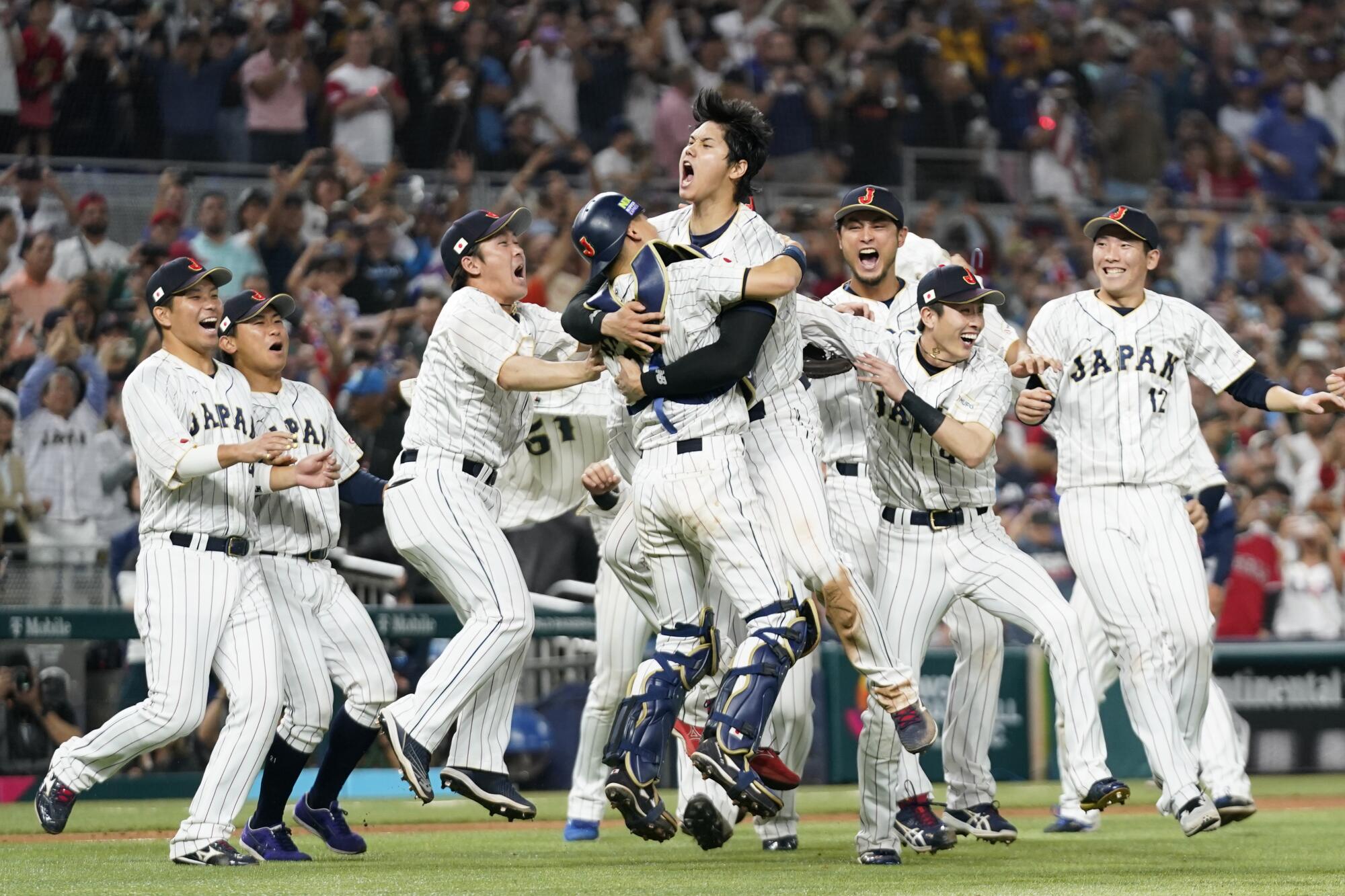
- Share via
This isn’t just about what’s best for Shohei Ohtani anymore. This is about what’s best for baseball.
Ohtani can’t sign another contract with the Angels.
When Ohtani becomes a free agent next winter, he has to move on, and he has to move on to a team that will offer him a chance to play baseball every single October.
His talent requires it. His mentality demands it.
He’s made for the big stage.
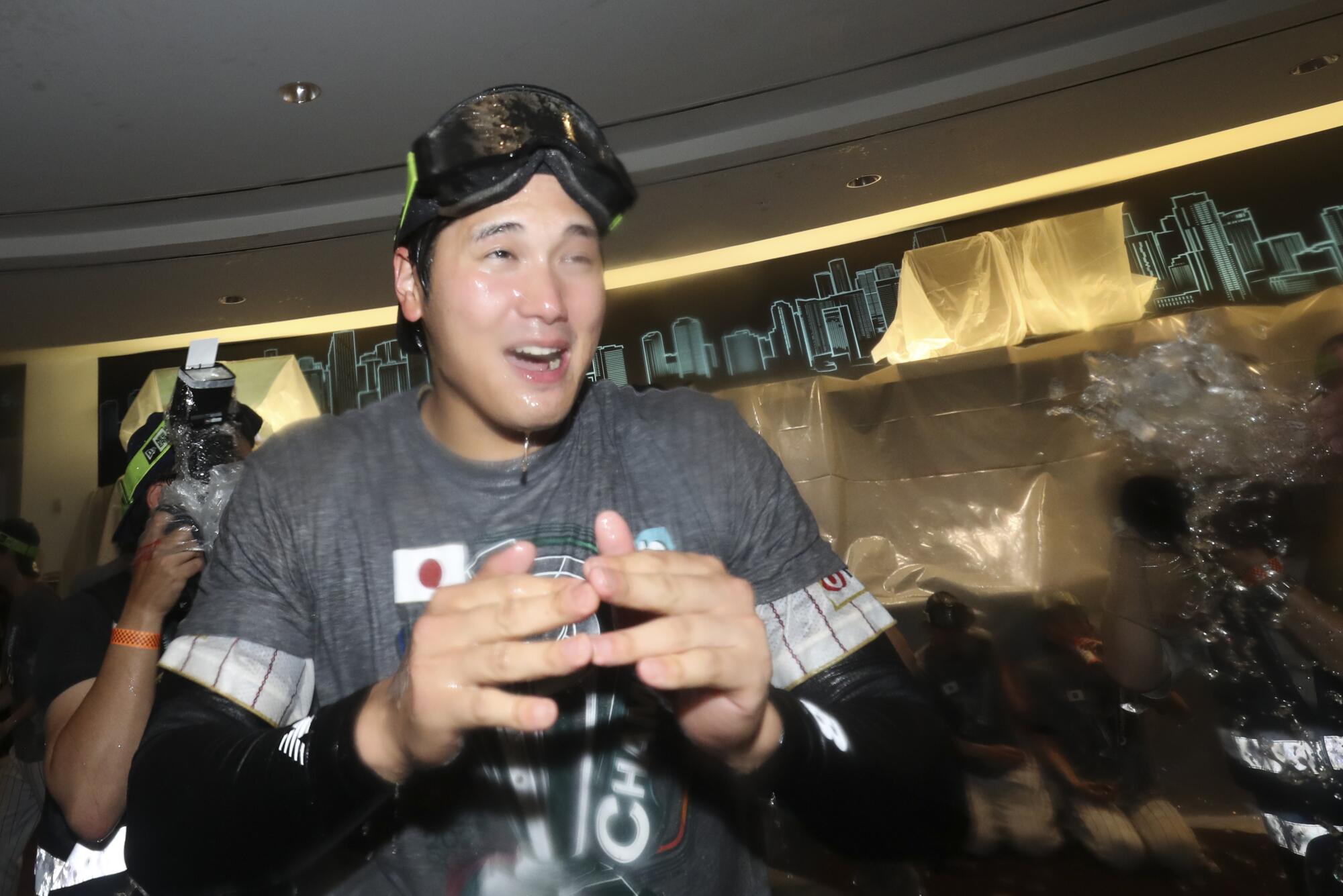
That was the single greatest takeaway from the World Baseball Classic, which concluded Tuesday night with Ohtani striking out Mike Trout on a full-count slider.
With Ohtani closing out a 3-2 victory over the United States, Japan won the WBC for a record third time. Ohtani was named the tournament’s most valuable player.
“Without doubt, up to this point, this is the best moment of my career,” Ohtani said in Japanese to reporters at LoanDepot Park in Miami.
The 28-year-old two-way player said he was hopeful the Angels could have a similarly glorious finish to their upcoming season.
“The season is about to start,” Ohtani said. “I think the next step is to win in the postseason, the World Series.”
Say he does. Say injury-prone Trout plays 140 regular-season games. Say broken-down Anthony Rendon plays 120. Say the offseason moves made by general manager Perry Minasian work out. Say the Angels reach the playoffs for the first time in Ohtani’s six years with them.
Ohtani still has to leave.
By extending their season into October, the Angels will have caught lightning in a bottle. That’s not a formula for sustained success. No team owned by Arte Moreno will contend year after year after year.
Shohei Ohtani, the tournament MVP, got the save and struck out Mike Trout for the last out as Japan beat the United States 3-2 in the WBC title game.
Ohtani should spend the remainder of his career on a franchise that expects to reach the postseason, not one that hopes to. Anything less would be a disservice not only to himself but also to the sport.
How exhilarating was it watching Ohtani hurl his glove and cap into the air after striking out Trout? How fun was it watching him smile as much as he did throughout the tournament?
This could be every October. This should be every October.
Baseball shouldn’t have to wait three more years until the next WBC to see this version of Ohtani.
A couple of months before this tournament, Japan manager Hideki Kuriyama said he had visions of a certain pitcher closing out the championship game. Asked in the wake of the victory over the U.S. if that pitcher was Ohtani, Kuriyama said to reporters in Japanese, “I’ll leave that to your imagination.”
How could Kuriyama have pictured using anyone else?
The life of a Japanese journalist, one assigned to cover the country’s biggest star playing in Major League Baseball, is all-consuming and relentless.
Years ago, Kuriyama had convinced an 18-year-old Ohtani to sign with the Nippon-Ham Fighters instead of the Dodgers by offering him a chance to both pitch and hit. During their five years together with the Fighters, Kuriyama learned to trust Ohtani enough to call on him to close out a league championship series in 2016. The Fighters went on to win the Japan Series.
What was evident then, and what was evident throughout this WBC, was that Ohtani doesn’t choke. He plays up to the occasion.
In the tournament semifinals against Mexico, Ohtani started Japan’s ninth-inning comeback. Before his at-bat, he later said to MLB Network, “I had decided I was going to get on base no matter what.”
Evidently, outs are a choice for Ohtani, who drove a pitch that was several inches off the plate into the right-center field gap for a leadoff double.
When he emerged from the bullpen a day later in the ninth inning against the U.S., the first batter up was Jeff McNeil, the reigning National League batting champion. Behind McNeil were Mookie Betts, Trout and Paul Goldschmidt.
Ohtani walked McNeil.
“He didn’t seem rattled by walking Jeff McNeil on a close pitch down,” U.S. manager Mark DeRosa told reporters in Miami. “Not rattled that three MVPs were coming up to bat.”
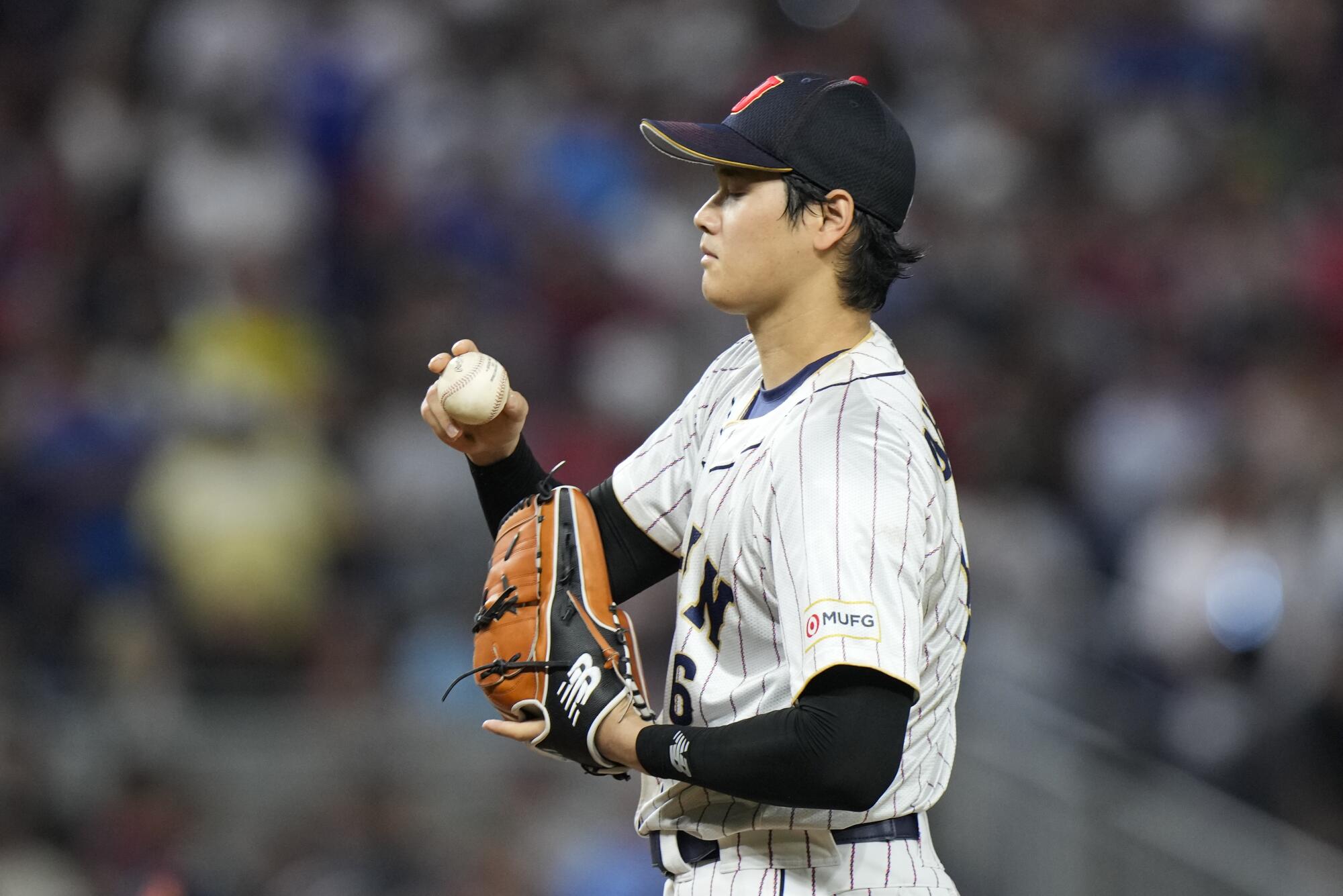
Ohtani forced Betts to ground into a double play to set up his game-ending showdown with Trout.
Ohtani finished the WBC with a 1.86 earned-run average. He won both of his starts. He also batted .435 with a homer, four doubles, eight runs batted in and nine runs scored. His 10 walks were the most in the tournament.
He was more than Japan’s best player. He emerged as the team’s leader.
Before the final, Ohtani delivered a calm but galvanizing speech to his teammates about how they should temporarily set aside their admiration of their opponents. He mentioned how the U.S. had famous players at every position — Goldschmidt at first base, Trout in center, Betts in right, and so forth.
“If you admire them, you can’t surpass them,” Ohtani said. “We came here to surpass them, to reach the top. For one day, let’s throw away our admiration for them and just think about winning.”
In the wake of Japan’s win, Ohtani continued to be a source of motivation. Right-hander Yu Darvish, 36, said to reporters that Ohtani said to him, “Let’s do this again in three years.”
“I’ll aim for that and do my best,” Darvish said in Japanese.
That’s not to say Ohtani didn’t feel any pressure. Even before he came to the major leagues, he was Japan’s most popular athlete, and adoration for him has only increased since. In a country in which more than 40% of television sets watched each of his team’s group-stage games, there was a particularly intense focus on him.
When he scaled the mound in the championship game, he told MLB Network, “I thought my heart was going to come out of my chest.”
However, he continued, “Once I got on the mound, I wanted to give my best as a way to repay baseball. I was nervous, but more than that, I was grateful.”
Here’s another way Ohtani can give back to the game that has given him so much: He can find a new team next winter, one that offers him the kind of stage this WBC did. This is where he belongs. This is where he can do the most, both for his legacy and the game he loves.
Mike Trout said during a press conference that he’ll do whatever he can to keep Shohei Ohtani with the Angels, but understands Ohtani will do what’s best.
More to Read
Go beyond the scoreboard
Get the latest on L.A.'s teams in the daily Sports Report newsletter.
You may occasionally receive promotional content from the Los Angeles Times.

